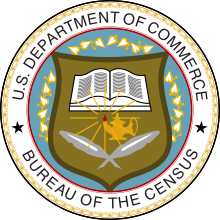| Thirteenth census of the United States | ||
|---|---|---|
| ||
 U.S. Census Bureau seal | ||
| General information | ||
| Country | United States | |
| Results | ||
| Total population | 92,228,496 ( | |
| Most populous | New York 9,113,614 | |
| Least populous | Nevada 81,875 | |
The 1910 United States census, conducted by the Census Bureau on April 15, 1910, determined the resident population of the United States to be 92,228,496, an increase of 21 percent over the 76,212,168 persons enumerated during the 1900 census. The 1910 census switched from a portrait page orientation to a landscape orientation.
This was the last census in which Texas did not record any top 50 largest cities by population, despite being the 5th most populous state at the time. It was also the first census in which all the top 50 largest cities had population over 100,000, and the first census to occur after New York City's five-borough amalgamation — Brooklyn was previously the 4th largest city in the United States on its own.
The 1910 census was the first to use metropolitan districts, the predecessor to modern metropolitan statistical areas, which were defined for all cities with at least 200,000 people.[1]
- ^ Gardner, Todd (February 2021). Changes in Metropolitan Area Definition, 1910–2010 (PDF). Center for Economic Studies (Report). United States Census Bureau. p. 12. Retrieved January 26, 2024.